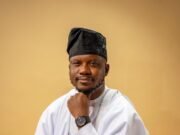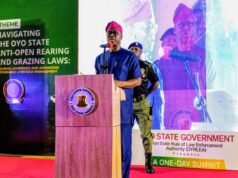NIGERIA’s problems have aggravated due to the perceived domination of the national scene by a tribe at the detriment of over four 400 minority groups making up Nigeria. The tribe, it appears, wants to remain in power at all cost. Beginning from the era of Alhaji Abubakar Tafawa Balewa as a prime minister till date, one of the three major ethnic nationalities had dominated the national politics. This is because there is no place for zoning or rotational formula in the Nigerian Constitution. Similarly and situating the scenario to Oyo State, a common feature of the politics of the ‘pace setter’ state since the return of democracy in 1999 is the seeming suppression of other zones of the state by Ibadan, the state capital, from occupying the exalted Agodi Government House. The state, like other states, comprises three senatorial districts: Oyo South, Oyo Central and Oyo North. Beyond this demarcation, the state is divided into zones: Ibadan, Ibarapa, Ogbomoso, Oke-Ogun, and Oyo.
Historically, Oyo State was founded on February 3, 1976 when the defunct Western Region was divided into Ogun, Ondo and Oyo states. With the composition, the present Osun State was part of the old Oyo State. In the old Oyo State, Chief Bola Ige, from Esa Oke (present Osun), was governor between October 1, 1979 and September 30, 1983. From October 1, 1983, Dr Victor Omololu Olunloyo, an Ibadan man, was in the saddle before the coup d’état of December 31, 1983. Later, Chief Kolapo Olawuyi Ishola came in on January 2, 1992 and left in November 17, 1993. It is imperative to note that during the governorship of Chief Bola Ige, his deputy, Chief Bisi Akande, was from Ila-Orangun, in the present Osun State. He was never from Ibadan. However, since the return of democracy in the Fourth Republic in 1999, there have been six different four-term dispensations and, interestingly, five were from Ibadan. It went in this order: 1999 (Ibadan), 2003 (Ibadan), 2007 (Ogbomoso), 2011 (Ibadan), 2015 (Ibadan), 2019 (Ibadan). Out of the three senatorial districts, Oyo South, with 11 local government areas from Ibadan and Ibarapa zones, has always had it, except when Oyo North, comprising 13 local government areas form Oke-Ogun and Ogbomoso zones, narrowly had it in 2007 in the person of Chief Adebayo Alao-Akala of Ogbomoso extraction. Oyo Central, with 9 local government areas (covering some parts of Ogbomoso, Oyo and Ibadan less city), never tasted it since 1999.
This present dominance is ironic, going by the history predating the creation of 12 states from the regions. During the era of regionalism, for instance, only Ikene, in the present Ogun State, and Ogbomoso, in the present Oyo State, produced the sage, Chief Jeremiah Obafemi Awolowo, and the polyglot, Chief Samuel Ladoke Akintola, as premiers of the Old Western Region respectively. They were never from Oluyole. Though there is no constitutional basis for zoning, the domineering of the governorship of the state is an apparent suppression of the other zones. Bearing the saying “what’s sauce for the goose is sauce for the gander” in mind, a former governor of the state, Chief Adebayo Alao Akala, spits fire in his autobiography titled “Amazing Grace” on the domination of the entire state by Ibadan. Advocating equitable rotation of Oyo governorship seat among the three senatorial districts, Alao-Akala hinged his stance on the need to promote fairness and create a sense of belonging among other vast zones of the state.
He explained that, though the rotational formula is not captured in the 1999 Constitution as amended, “Political parties and players at the national level and in many states have reflected the tenet (rotation) since the advent of the nation’s nascent democracy. However, that pact seems not to have penetrated Oyo State. It is agreed that merits such as robust antecedents, intrinsic personal capacity, genuine knowledge of the
people and capacity to sell the vision to the people should determine who becomes governor in the state and not whether one belongs to the majority or minority. Nevertheless, merit cannot be the exclusive preserve of only a section of the state.”
At many forums and interpersonal levels, the issue of equitable rotation of Oyo governorship has gained traction across the other four seemingly marginalised zones and two senatorial districts. In Osun State, for instance, no indigene of Osogbo, the state capital, has ever been governor since 1999. Chief Bisi Akande, Prince Olagunsoye Oyinlola, Mr Rauf Aregbesola and Mr Gboyega Oyetola are indigenes of Ila-Orangun, Okuku, Ilesha and Iragbiji respectively. The same thing goes to Ondo and Ekiti states where Akure and Ado-Ekiti never produced governors. There are two implications here: with rotational system, the said capital citiesof Osun and Ekiti would probably have tasted the power. It also implies that the state capitals should not wield so much power as does Ibadan. The equitable rotational governorship in Oyo State among the three senatorial districts would, no doubt, give room for even development; create a sense of belonging for the other two districts; avoid the domineering role of Ibadan; open the chance for a large spectrum of competent, exposed and brilliant citizens from the other zones and districts to bring their wealth of experience and develop the state.
Many of the brilliant competent people aspiring to be governor, outside Ibadan, would have been told that they would have been the best fit for the job if not because they are non-Ibadan indigenes. And aspirants in this regard have always wondered why their place of origin is a factor working against them and why their origin is a measure of their competence. In a way, allowing other zones to taste the power will mean so much for the people outside the state capital. For instance, when Alao-Akala was in power, he would always spend weekends in Ogbomoso, his home town. This greatly boosted the economy of the zones because of the avalanche of his aides and contractors that would visit him. So many people across other zones got political appointments. It is logical to say that if no governor can emerge without the support of the voters from other zones and districts, then, why must it be the exclusive preserve of a zone out of five? Albeit, recognising that the Nigerian Constitution does not accommodate the zoning arrangement, this piece is, therefore, a clarion call on the political class, political parties, activists, traditional rulers as custodians of culture and tradition, and the electorate to critically rise above primordial sentiments and make our towns, cities and senatorial districts equitable for all and sundry.
Adepoju teaches at the University of Calabar, Cross River State.
































